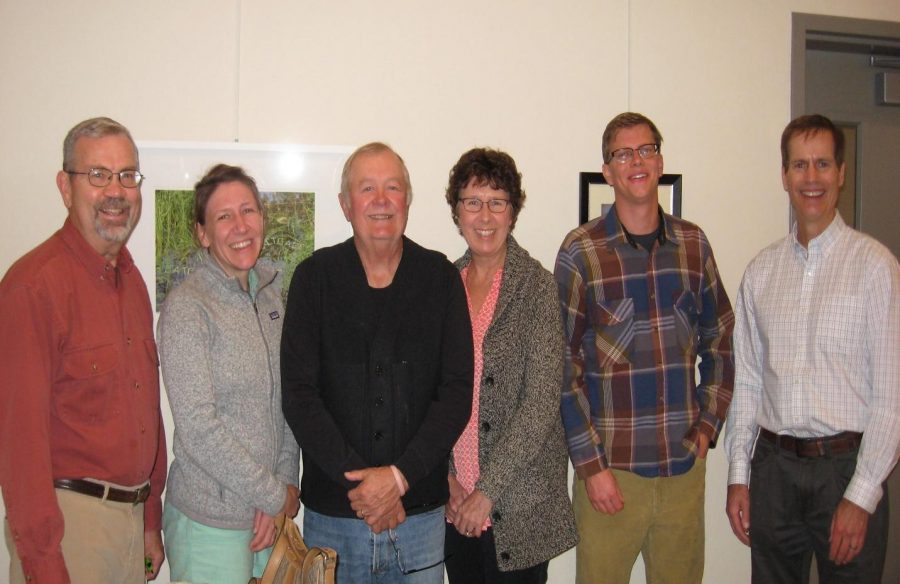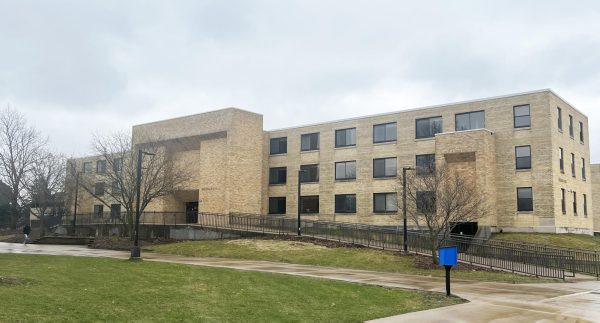Healthy Soil for a Healthy Future
A community conversation about “Healthy Soil for a Healthy Future” addressed issues and answers October 15 and 16 at the Platteville Public Library.
About 80 farmers, gardeners, students, and soil advocates attended presentations that emphasized regenerative soil practices. Three short videos focused on the economic and environmental impacts of depleting soil resources, while speakers addressed rebuilding and restoring organic matter in soil to nurture plant life.
The Platteville Main Street Sustainability Committee and the University of Wisconsin-Platteville Sustainability program sponsored the events. Other groups represented included the Southwest Badgers Resource Conservation & Development Council, Grant County Rural Stewardship, and the Sinsinawa Mound Collaborative Farm.
“Research shows that 1.7 billion tons of top soil was lost to erosion in 2015 in the United States,” said Gary Munson of Platteville, a member of the Main Street Sustainability Committee. “The loss is 10 times faster than the rate of replenishment. We can’t continue with that kind of soil loss. We have to begin looking for ways to rebuild, or regenerate, our productive soil.”
“Our current production model works on a short-term basis, but in the future more commercial food production operations should convert to regenerative approaches that restore soil health, improve food nutrition, and revitalize profits,” Munson said.
In a YouTube video titled “Regeneration of Our Lands: A Producer’s Perspective,” North Dakota rancher Gabe Brown explained the five principles of regenerative agriculture: 1. Use a small amount of mechanical disruption with no-till or low-till practices. 2. Protect soil with cover crops. 3. Maintain plant diversity in grazing plots and practice thoughtful crop rotation. 4. Keep living roots in the ground as long as possible. 5. Animals make a positive impact.
“We want to address our problems through biological means, not chemicals,” Brown said. He emphasized that, since beginning to use those practices in 1994, the ranch is profitable every year and accepts no government subsidies.
Tom Hamm of Platteville, who farms 220 acres where he began no-till practices in 2011, said he harvested 268 bushels of corn per acre this year. His crop rotation includes corn, soybeans, wheat, and alfalfa while using radishes with oats as a cover crop.
“You’ve got to have a plan to start with to plant seed right,” Hamm said in an interview. “I knew no-till would work because I had seen it work. Now, one of my neighbors is going no-till after seeing my crops.”
Jeff Jackson, stewardship specialist with Southwest Badger, said that one of the many services available through the non-profit organization is a thorough soil test to help landowners make the best soil management decisions.
In a prepared statement, Southwest Badger Executive Director Tony Ends wrote, “Regenerating soil is a long-term commitment. It can easily take nature 100 years to produce an inch of fertile soil. One pass with a conventional plow over a field can rapidly remove 80 percent of the carbon in its soil. A proper balance of carbon and nitrogen is what the micro-biotic engines of soil fertility need to complete a regenerative cycle.
“Cover crops, perennial grasses, and grazing establishment are excellent first steps to regenerating soils. They can begin to mirror the expansive native grass and bison herd system that helped create some of the best soils in the world.”
For more information and resources, contact the following groups.
@ Southwest Badger Resource Conservation & Development Council, www.swbadger.org, (608) 348-7110.
@ UW-Platteville Sustainability Green Campus Project, www.GCPPlatteville.org, (608) 342-7244.
@ Platteville Main Street Sustainability Committee, www.plattevillemainstreet.com, (608) 348-4505.
Munson compiled a two-page handout that summarizes important sources about regenerative soil strategies. The handout is available from Munson ([email protected] or 608-348-4064).
@ Sinsinawa Mound Center, www.sinsinawa.org/moundcenter, (608) 748-4411.
@ Grant County Rural Stewardship, www.facebook.com/grantcountyruralstewardship/, (608) 642-3054.














